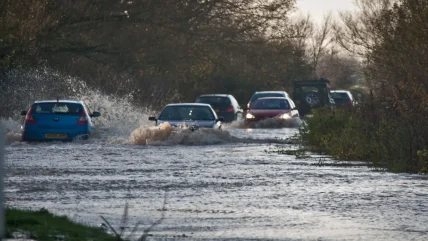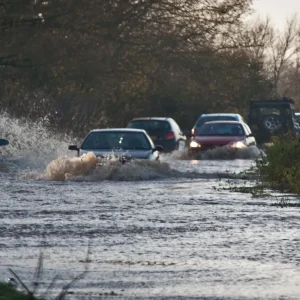
The UK has been no stranger to extreme weather events in recent years. From torrential rains and devastating floods to severe heatwaves, the unpredictability of the weather has had far-reaching implications for many sectors, not least the business car fleet market. As these weather patterns become more frequent and intense due to climate change, businesses are grappling with the need to adapt and mitigate risks to their fleet operations.
The Rising Frequency and Intensity of Extreme Weather
The UK Met Office has reported a noticeable increase in the frequency and severity of extreme weather events over the past decade. In 2022 alone, the UK experienced its hottest summer on record, coupled with significant rainfall deficits that led to widespread drought conditions. Conversely, the winter of 2023 saw unprecedented rainfall, resulting in severe flooding across many regions.
These changes pose several direct and indirect challenges to businesses that rely on car fleets. From logistical disruptions to increased maintenance costs, the impact on the fleet market is profound and multifaceted.
Direct Impacts on Fleet Operations
Disruption of Supply Chains and Logistics
Extreme weather events can severely disrupt supply chains and logistics. Floods and snowstorms can render roads impassable, delaying deliveries and reducing operational efficiency. For businesses with just-in-time delivery models, these disruptions can be particularly costly.
In December 2023, heavy snowfall in Scotland led to road closures that stranded hundreds of vehicles, including business fleets. Companies faced delays in both receiving supplies and delivering products, leading to significant financial losses.
Increased Vehicle Maintenance and Repair Costs
Adverse weather conditions accelerate wear and tear on vehicles. Floodwaters can damage engines and electrical systems, while potholes from frost damage can wreak havoc on tyres and suspension systems. Consequently, fleet operators are seeing a rise in maintenance and repair costs.
A survey by the British Vehicle Rental and Leasing Association (BVRLA) in 2023 indicated that fleet maintenance costs had increased by 15% over the previous year, with extreme weather cited as a primary factor. Businesses are now more frequently replacing parts and dealing with vehicle downtime, which hampers productivity.
Indirect Impacts on Fleet Management
Higher Insurance Premiums
The risk associated with extreme weather events has not gone unnoticed by insurers. The Association of British Insurers (ABI) has reported a steady increase in claims related to weather damage, prompting a rise in insurance premiums for fleet operators. In areas particularly prone to flooding, some businesses have struggled to obtain adequate coverage altogether.
Insurance costs for business car fleets rose by an average of 10% in 2023, with further increases expected as the frequency of extreme weather events continues to climb. This added financial burden is prompting fleet managers to seek innovative ways to mitigate risks and manage costs.
Changes in Driver Behaviour and Training Needs
Extreme weather conditions necessitate changes in driver behaviour and additional training. Drivers must be adept at handling vehicles in adverse conditions to ensure safety and minimise damage. This need for specialised training represents an additional cost and logistical challenge for fleet operators.
Many companies are investing in advanced driver assistance systems (ADAS) and telematics to monitor and improve driver performance. These technologies can provide real-time feedback and help enforce safer driving practices, thereby reducing accident rates and associated costs.
Strategic Responses by Fleet Operators
Adoption of Electric Vehicles (EVs)
The shift towards electric vehicles (EVs) is gaining momentum as businesses seek to mitigate the impact of extreme weather. EVs offer several advantages in this context. For instance, they generally have fewer moving parts than internal combustion engine (ICE) vehicles, which can translate to lower maintenance needs, especially in challenging weather conditions.
Additionally, the UK government’s push for greener transport solutions through incentives and regulations makes EV adoption an attractive proposition. In 2023, the government extended grants for EV purchases and charging infrastructure, further encouraging businesses to transition their fleets.
Investment in Telematics and Fleet Management Software
Telematics and advanced fleet management software have become essential tools for navigating the challenges posed by extreme weather. These technologies provide real-time data on vehicle location, condition, and performance, enabling fleet managers to make informed decisions quickly.
For example, during the floods of January 2023, many companies used telematics to reroute their vehicles away from affected areas, minimising delays and damage. The ability to proactively manage routes and monitor vehicle health is crucial in reducing the operational impact of extreme weather.
Enhancing Fleet Resilience Through Diversification
Another strategic response is diversifying the types of vehicles within a fleet. By including a mix of vehicle types, such as SUVs and all-terrain vehicles (ATVs), businesses can ensure they have the appropriate resources to maintain operations under various weather conditions.
The rise in extreme weather events has prompted some fleet operators to incorporate more resilient vehicles capable of handling severe conditions. This diversification strategy helps maintain service continuity and reduces the likelihood of weather-related disruptions.
The Role of Government and Industry Bodies
Regulatory Support and Incentives
Government regulations and incentives play a pivotal role in shaping the response to extreme weather impacts. The UK government’s commitment to achieving net-zero emissions by 2050 includes several measures aimed at supporting the transition to sustainable fleet operations. These measures include grants for EVs, funding for charging infrastructure, and tax incentives for businesses adopting green technologies.
The Road to Zero Strategy, introduced in 2018 and continually updated, outlines the government’s vision for reducing emissions from road transport. This strategy includes specific targets and support mechanisms for fleet operators, encouraging the adoption of low-emission vehicles and advanced fleet management practices.
Industry Collaboration and Knowledge Sharing
Collaboration within the industry is essential for developing effective responses to the challenges posed by extreme weather. Industry bodies like the BVRLA and the Freight Transport Association (FTA) facilitate knowledge sharing and best practice dissemination among fleet operators.
Regular conferences, workshops, and publications provide platforms for discussing innovative solutions and strategies. These collaborative efforts are instrumental in helping businesses stay informed about the latest developments and adapt to the evolving landscape.
The Future Outlook
The impact of extreme weather on the business car fleet market in the UK is set to intensify as climate change progresses. However, with proactive measures and strategic planning, businesses can mitigate these impacts and maintain resilient operations.
Emerging Technologies and Innovations
The rapid advancement of technology offers promising solutions for managing the effects of extreme weather. Innovations in vehicle design, such as improved waterproofing and all-weather tyres, are helping to enhance vehicle durability.
Additionally, the development of predictive analytics and AI-driven fleet management systems can provide businesses with the tools to anticipate and respond to weather-related disruptions more effectively. These technologies enable fleet operators to optimise routes, manage maintenance schedules, and ensure driver safety in adverse conditions.
Sustainable Practices and Environmental Responsibility
Sustainability is becoming an integral part of business strategy, and the fleet sector is no exception. By adopting greener practices and technologies, businesses can not only reduce their environmental impact but also enhance their resilience to extreme weather.
The use of renewable energy sources for vehicle charging, investments in carbon offset programmes, and efforts to minimise waste and emissions are all part of a broader movement towards sustainability in the fleet industry. These practices not only align with regulatory requirements but also resonate with customers and stakeholders who are increasingly prioritising environmental responsibility.
Conclusion
Extreme weather events are posing significant challenges to the business car fleet market in the UK. From logistical disruptions and increased maintenance costs to higher insurance premiums and the need for enhanced driver training, the impacts are wide-ranging and complex.
However, by adopting strategic responses such as transitioning to electric vehicles, investing in telematics, diversifying fleets, and embracing sustainable practices, businesses can navigate these challenges effectively. Government support and industry collaboration are also crucial in helping the sector adapt and thrive in the face of climate change.
As the frequency and intensity of extreme weather events continue to rise, the business car fleet market must remain agile and innovative. By staying ahead of the curve and leveraging emerging technologies, fleet operators can ensure resilience and sustainability in their operations, securing a competitive edge in an increasingly unpredictable world.





